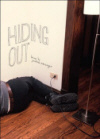Hiding Out
Jonathan Messinger’s debut collection of short stories, Hiding Out, hits the mark in every possible way. From the winding layout of the book, to the basic line drawings accompanying each story, to the wildly engaging story plots, Messinger’s book storms out of nowhere, his characters real enough to leave fingerprints on a windowpane.
Jonathan Messinger’s debut collection of short stories, Hiding Out, hits the mark in every possible way. From the winding layout of the book, to the basic line drawings accompanying each story, to the wildly engaging story plots, Messinger’s book storms out of nowhere, his characters real enough to leave fingerprints on a windowpane.
Where the book begins is anyone’s guess. Reading closely, I first discovered a fifty word short-short embedded in the copyright page:
This Story of 50 Words Feels as Though It Ran a Little Long, Maybe by 5 Words
There is little left for Connie to do. Her options: exhausted. Her headlights: dimmed. Her friends: silent. She lets slip her car keys into the floorboard and neutralizes the gears. The dark car lacks any resistance, overwhelming her with its speed as it rolls downhill. She thinks of no lovers.
Following this hideaway story comes an easier to locate “Captain Tomorrow,” reminiscent of the long summer afternoons many of us spent parentless in the basement, devising all sorts of ridiculous and possibly dangerous things to do out of sheer boredom. Alex, 13, is enamored with a video game called “Captain Tomorrow,” unable to make it past level 5. Meanwhile his sister Johanna, 16, home from a flea market, introduces a tape of people staging suicide by leaping from tall buildings. This opening story coins two of Messinger’s most effective techniques: a unique situation, (combined with) everyday people whose lives and motivations are as familiar as our own.
The story “Bicycle Kick” involves a regular Joe who suddenly discovers he has a double aneurysm in his brain, courtesy of the CAT scan he undergoes from being smacked in the eye with a soccer ball.
The CAT scan had shown I had an unusual condition in my head. Two aneurysms, side-by-side. Two bloated vessels that could, given enough emotional or physical stress, burst, sending squid clouds of blood over my brain, erasing thoughts, functions, memories—irreparable damage. Highly unusual, to have two such advanced aneurysms so close together, [the doctor] assured me, as if I should be proud. Like I was up for the Guinness Book.
Mimicking the seemingly random tragedies of life, Messinger’s story births a character we can sympathize with, without being forced to over-invest emotionally.
One of the most delightfully quirky items comes in the form of “Not Even The Zookeeper Can Keep Control.” Maybe it’s just my offbeat sense of humor, but anything that revolves around a man-eating wolf “permitted…to chew on the old bones of dead prisoners” is, for me, an immediate winner. Exhibit A:
Tourists went to the zoo and watched it from behind bulletproof glass. The wolf salivated at the sight of the onlookers, drool lolling from his jaws and, on occasion, he pointed at the most frightened as if ordering at a deli.
An expert at delivering humor, Messinger’s “Zookeeper” is driven by the town’s misguided effort to recapture the escaped wolf, the beast devouring everyone in its path. Ironically, the high school principal’s bid to control the situation evolves into a critique of organized religion, and the author still manages to round out the work with a pleasingly understated truth about love and relationships.
Messinger’s characters are beguiling in their persistent loneliness, their relief found only in risking a new relationship or mustering the courage to recoup an old one. Stories like “Hiding Out” and “True Hero” are fueled by the needling desire to finally cast off the self-doubt we allow to eclipse our dreams, and truly vie for what we want even though we may fail in the end. It helps that the protagonists are insecure or eccentric enough to write themselves self-reflexive e-mails every half hour or try to win back an ex-girlfriend by donning a super-fine robot costume.
Pregnant with insight into the human psyche, yet unremittingly basic in their logic, Messinger’s stories earn him the title “master of pedestrian philosophy.” I would recommend this book to anyone game enough to realize their life-long ambitions, if only vicariously.





